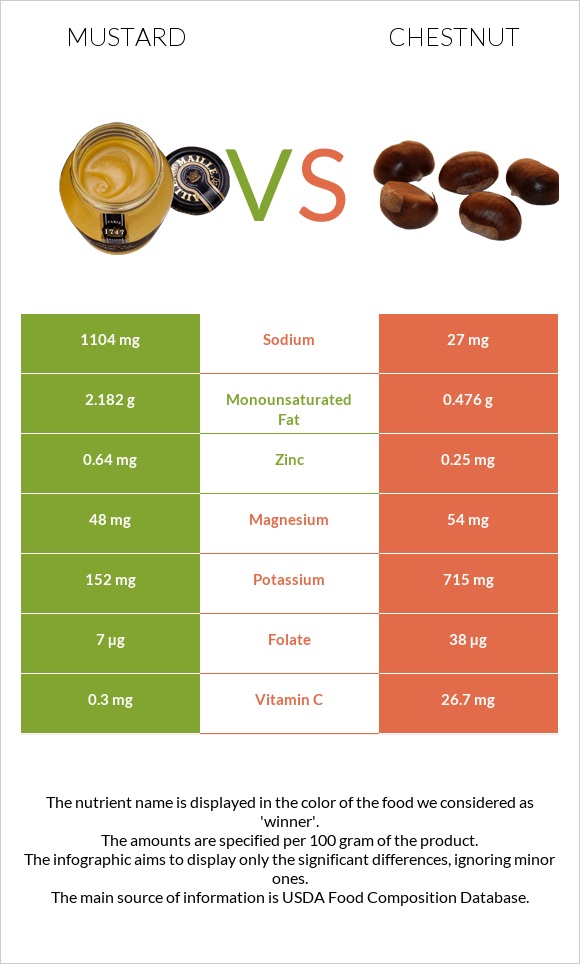Mustard vs. Chestnut — In-Depth Nutrition Comparison
Compare
What are the differences between mustard and chestnut?
- Mustard is higher in monounsaturated fat, yet chestnut is higher in copper, vitamin C, manganese, potassium, vitamin B6, and folate.
- Mustard's daily need coverage for sodium is 47% more.
- Mustard has 5 times more monounsaturated fat than chestnut. While mustard has 2.182g of monounsaturated fat, chestnut has only 0.476g.
- The amount of sodium in chestnut is lower.
- The glycemic index of mustard is lower.
We used Mustard, prepared, yellow and Nuts, chestnuts, european, boiled, and steamed types in this article.
Infographic

Infographic link
Mineral Comparison
Mineral comparison score is based on the number of minerals by which one or the other food is richer. The "coverage" charts below show how much of the daily needs can be covered by 300 grams of the food.
| Contains more CalciumCalcium | +37% |
| Contains more ZincZinc | +156% |
| Contains more SeleniumSelenium | +∞% |
| Contains more MagnesiumMagnesium | +12.5% |
| Contains more PotassiumPotassium | +370.4% |
| Contains more CopperCopper | +537.8% |
| Contains less SodiumSodium | -97.6% |
| Contains more ManganeseManganese | +102.4% |
Vitamin Comparison
Vitamin comparison score is based on the number of vitamins by which one or the other food is richer. The "coverage" charts below show how much of the daily needs can be covered by 300 grams of the food.
| Contains more Vitamin AVitamin A | +400% |
| Contains more Vitamin EVitamin E | +∞% |
| Contains more Vitamin B1Vitamin B1 | +19.6% |
| Contains more Vitamin KVitamin K | +∞% |
| Contains more Vitamin CVitamin C | +8800% |
| Contains more Vitamin B2Vitamin B2 | +48.6% |
| Contains more Vitamin B3Vitamin B3 | +29.4% |
| Contains more Vitamin B5Vitamin B5 | +24.4% |
| Contains more Vitamin B6Vitamin B6 | +232.9% |
| Contains more FolateFolate | +442.9% |
All nutrients comparison - raw data values
| Nutrient |  |
 |
DV% diff. |
| Selenium | 33.5µg | 61% | |
| Sodium | 1104mg | 27mg | 47% |
| Copper | 0.074mg | 0.472mg | 44% |
| Vitamin C | 0.3mg | 26.7mg | 29% |
| Manganese | 0.422mg | 0.854mg | 19% |
| Potassium | 152mg | 715mg | 17% |
| Fiber | 4g | 16% | |
| Vitamin B6 | 0.07mg | 0.233mg | 13% |
| Folate | 7µg | 38µg | 8% |
| Carbs | 5.83g | 27.76g | 7% |
| Calories | 60kcal | 131kcal | 4% |
| Zinc | 0.64mg | 0.25mg | 4% |
| Choline | 22.4mg | 4% | |
| Monounsaturated fat | 2.182g | 0.476g | 4% |
| Protein | 3.74g | 2g | 3% |
| Fats | 3.34g | 1.38g | 3% |
| Vitamin B2 | 0.07mg | 0.104mg | 3% |
| Calcium | 63mg | 46mg | 2% |
| Iron | 1.61mg | 1.73mg | 2% |
| Vitamin E | 0.36mg | 2% | |
| Vitamin B1 | 0.177mg | 0.148mg | 2% |
| Polyunsaturated fat | 0.774g | 0.545g | 2% |
| Magnesium | 48mg | 54mg | 1% |
| Phosphorus | 108mg | 99mg | 1% |
| Vitamin B3 | 0.565mg | 0.731mg | 1% |
| Vitamin B5 | 0.254mg | 0.316mg | 1% |
| Vitamin K | 1.4µg | 1% | |
| Net carbs | 1.83g | 27.76g | N/A |
| Sugar | 0.92g | N/A | |
| Starch | 0.64g | 0% | |
| Vitamin A | 5µg | 1µg | 0% |
| Trans fat | 0.009g | N/A | |
| Saturated fat | 0.214g | 0.26g | 0% |
| Tryptophan | 0.009mg | 0.022mg | 0% |
| Threonine | 0.167mg | 0.071mg | 0% |
| Isoleucine | 0.146mg | 0.079mg | 0% |
| Leucine | 0.292mg | 0.118mg | 0% |
| Lysine | 0.264mg | 0.118mg | 0% |
| Methionine | 0.076mg | 0.047mg | 0% |
| Phenylalanine | 0.161mg | 0.084mg | 0% |
| Valine | 0.189mg | 0.112mg | 0% |
| Histidine | 0.119mg | 0.055mg | 0% |
| Fructose | 0.23g | 0% | |
| Omega-3 - ALA | 0.373g | N/A | |
| Omega-3 - Eicosatrienoic acid | 0.018g | N/A | |
| Omega-6 - Eicosadienoic acid | 0.01g | N/A | |
| Omega-6 - Linoleic acid | 0.358g | N/A |
Macronutrient Comparison
Macronutrient breakdown side-by-side comparison
| Contains more ProteinProtein | +87% |
| Contains more FatsFats | +142% |
| Contains more WaterWater | +22.8% |
| Contains more OtherOther | +374.6% |
| Contains more CarbsCarbs | +376.2% |
Fat Type Comparison
Fat type breakdown side-by-side comparison
| Contains less Sat. FatSaturated fat | -17.7% |
| Contains more Mono. FatMonounsaturated fat | +358.4% |
| Contains more Poly. FatPolyunsaturated fat | +42% |





